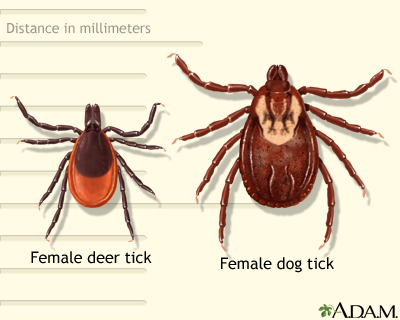Health Library
Tick removal
Ticks are small, insect-like creatures that live in woods and fields. They attach to you as you brush past bushes, plants, and grass. Once on you, ticks often move to a warm, moist location. They are often found in the armpits, groin, and hair. Ticks attach firmly to your skin and begin to draw blood for their meal. This process is painless. Most people will not notice the tick bite.
Some species of ticks can be as large as a pencil eraser. They can also be so small that they are very hard to see. They grow in size (engorgement) after attachment. Ticks can transmit bacteria that can cause disease. Some of these can be serious.
Images



I Would Like to Learn About:
Considerations
While most ticks do not carry bacteria that cause human diseases, some ticks do carry these bacteria. These bacteria can cause:
First Aid
If a tick is attached to you, follow these steps to remove it:
- Use tweezers to grasp the tick close to its head or mouth. Do not use your bare fingers. If you don't have tweezers and need to use your fingers, use a tissue or paper towel.
- Pull the tick straight out with a slow and steady motion. Avoid squeezing or crushing the tick. Be careful not to leave the head embedded in the skin.
- Clean the area well with soap and water. Also wash your hands thoroughly.
- Save the tick in a jar. Watch the person who was bitten carefully over the next week or two for symptoms of Lyme disease (such as rash or fever).
- If all parts of the tick can't be removed, get medical help. Bring the tick in the jar to your health care provider appointment.
Do Not
- Do not try to burn the tick with a match or other hot object.
- Do not twist the tick when pulling it out.
- Do not try to kill, smother, or lubricate the tick with oil, alcohol, petroleum jelly, or similar material while the tick is still embedded in the skin.
When to Contact a Medical Professional
Contact your provider if you have not been able to remove the entire tick. Also contact in the days following a tick bite if you develop:
- A rash
- Flu-like symptoms, including fever and headache
- Joint pain or redness
- Swollen lymph nodes
Call 911 or the local emergency number if you have any signs of:
- Chest pain
- Heart palpitations
- Paralysis
- Severe headache
- Trouble breathing
Prevention
To prevent tick bites:
- Wear long pants and long sleeves when walking through heavy brush, tall grass, and thickly wooded areas.
- Pull your socks over the outside of your pants to prevent ticks from crawling up your leg.
- Keep your shirt tucked into your pants.
- Wear light-colored clothes so that ticks can be spotted easily.
- Spray your clothes with insect repellant.
- Check your clothes and skin often while in the woods.
After returning home:
- Remove your clothes. Look closely at all your skin surfaces, including your scalp. Ticks can quickly climb up the length of your body.
- Some ticks are large and easy to locate. Other ticks can be quite small, so carefully look at all black or brown spots on the skin.
- If possible, ask someone to help you examine your body for ticks.
- An adult should examine children carefully.
References
Bolgiano EB, Sexton J. Tickborne illnesses. In: Walls RM, ed. Rosen's Emergency Medicine: Concepts and Clinical Practice. 10th ed. Philadelphia, PA: Elsevier; 2023:chap 123.
Cummins GA, Traub SJ. Tick-borne diseases. In: Auerbach PS, Cushing TA, Harris NS, eds. Auerbach's Wilderness Medicine. 7th ed. Philadelphia, PA: Elsevier; 2017:chap 42.
Diaz JH. Ticks, including tick paralysis. In: Bennett JE, Dolin R, Blaser MJ, eds. Mandell, Douglas, and Bennett’s Principles and Practice of Infectious Diseases. 9th ed. Philadelphia, PA: Elsevier; 2020:chap 296.
BACK TO TOPReview Date: 2/11/2023
Reviewed By: Jatin M. Vyas, MD, PhD, Associate Professor in Medicine, Harvard Medical School; Associate in Medicine, Division of Infectious Disease, Department of Medicine, Massachusetts General Hospital, Boston, MA. Also reviewed by David C. Dugdale, MD, Medical Director, Brenda Conaway, Editorial Director, and the A.D.A.M. Editorial team.
 | A.D.A.M., Inc. is accredited by URAC, for Health Content Provider (www.urac.org). URAC's accreditation program is an independent audit to verify that A.D.A.M. follows rigorous standards of quality and accountability. A.D.A.M. is among the first to achieve this important distinction for online health information and services. Learn more about A.D.A.M.'s editorial policy, editorial process and privacy policy. A.D.A.M. is also a founding member of Hi-Ethics. This site complies with the HONcode standard for trustworthy health information: verify here. |
The information provided herein should not be used during any medical emergency or for the diagnosis or treatment of any medical condition. A licensed medical professional should be consulted for diagnosis and treatment of any and all medical conditions. Links to other sites are provided for information only -- they do not constitute endorsements of those other sites. No warranty of any kind, either expressed or implied, is made as to the accuracy, reliability, timeliness, or correctness of any translations made by a third-party service of the information provided herein into any other language. © 1997- 2025 A.D.A.M., a business unit of Ebix, Inc. Any duplication or distribution of the information contained herein is strictly prohibited.
